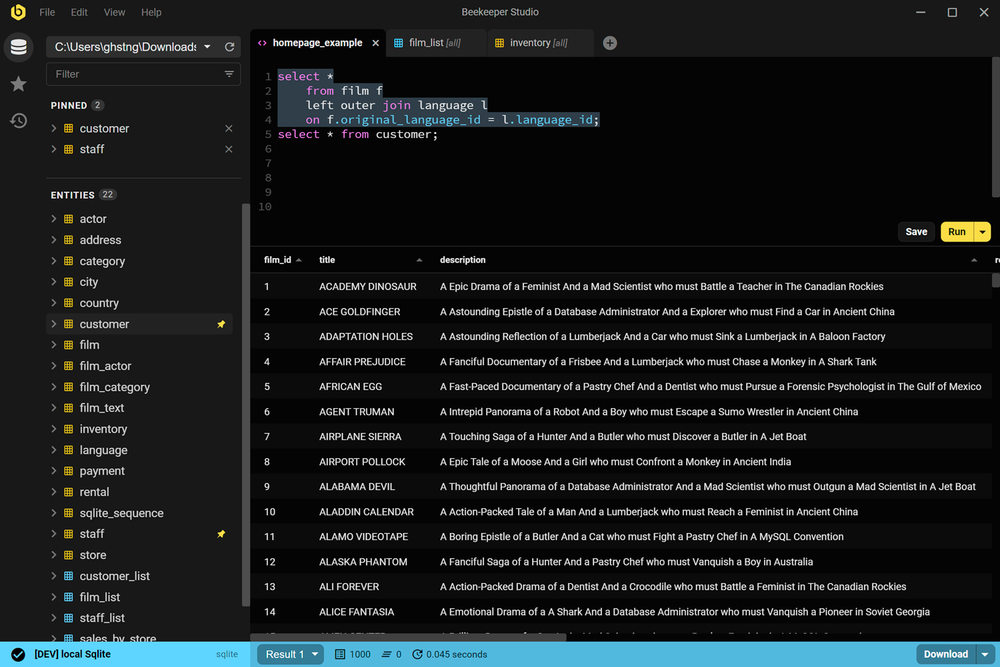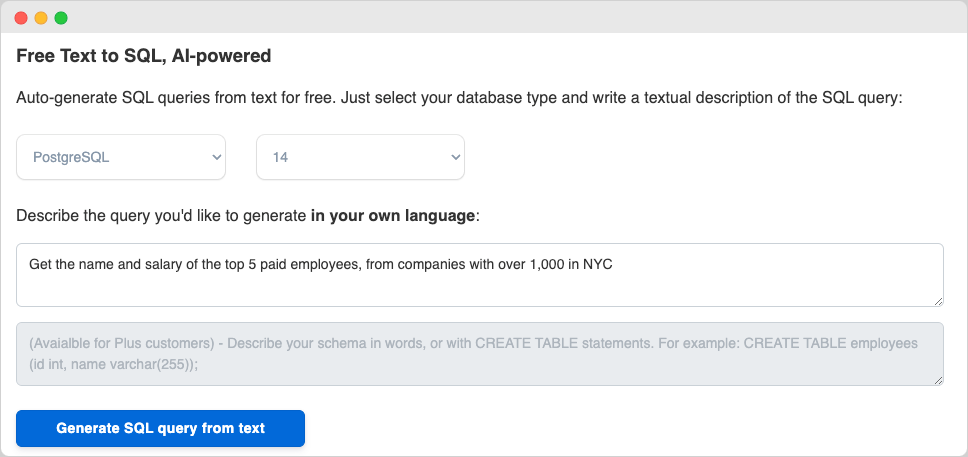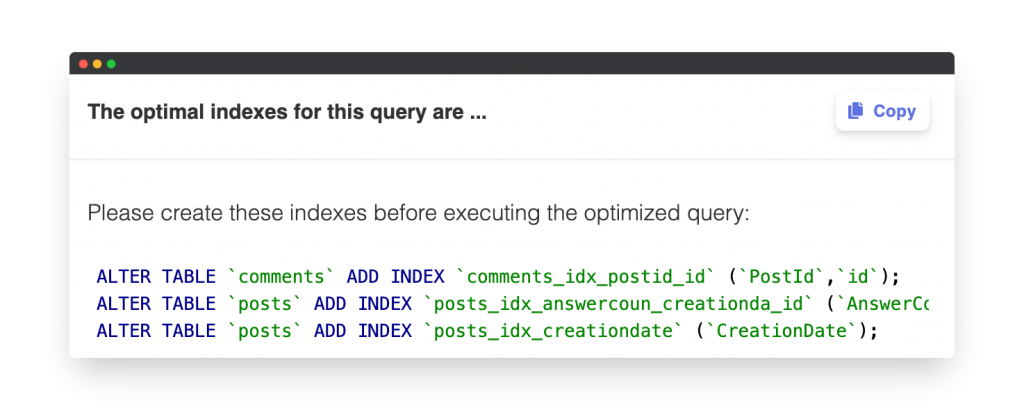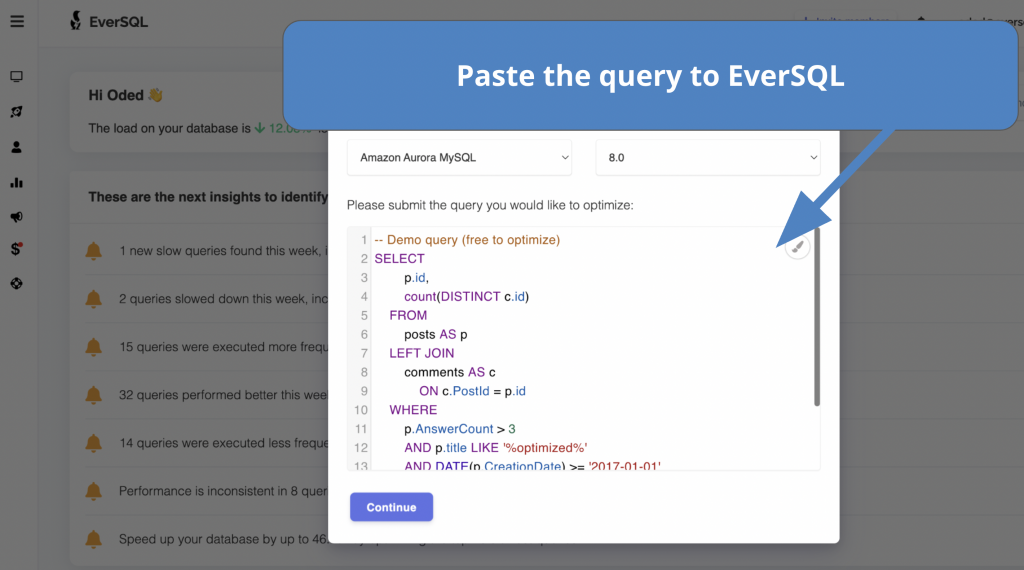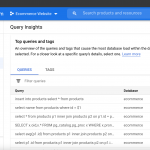This post's content
#1 - DataGrip by JetBrain
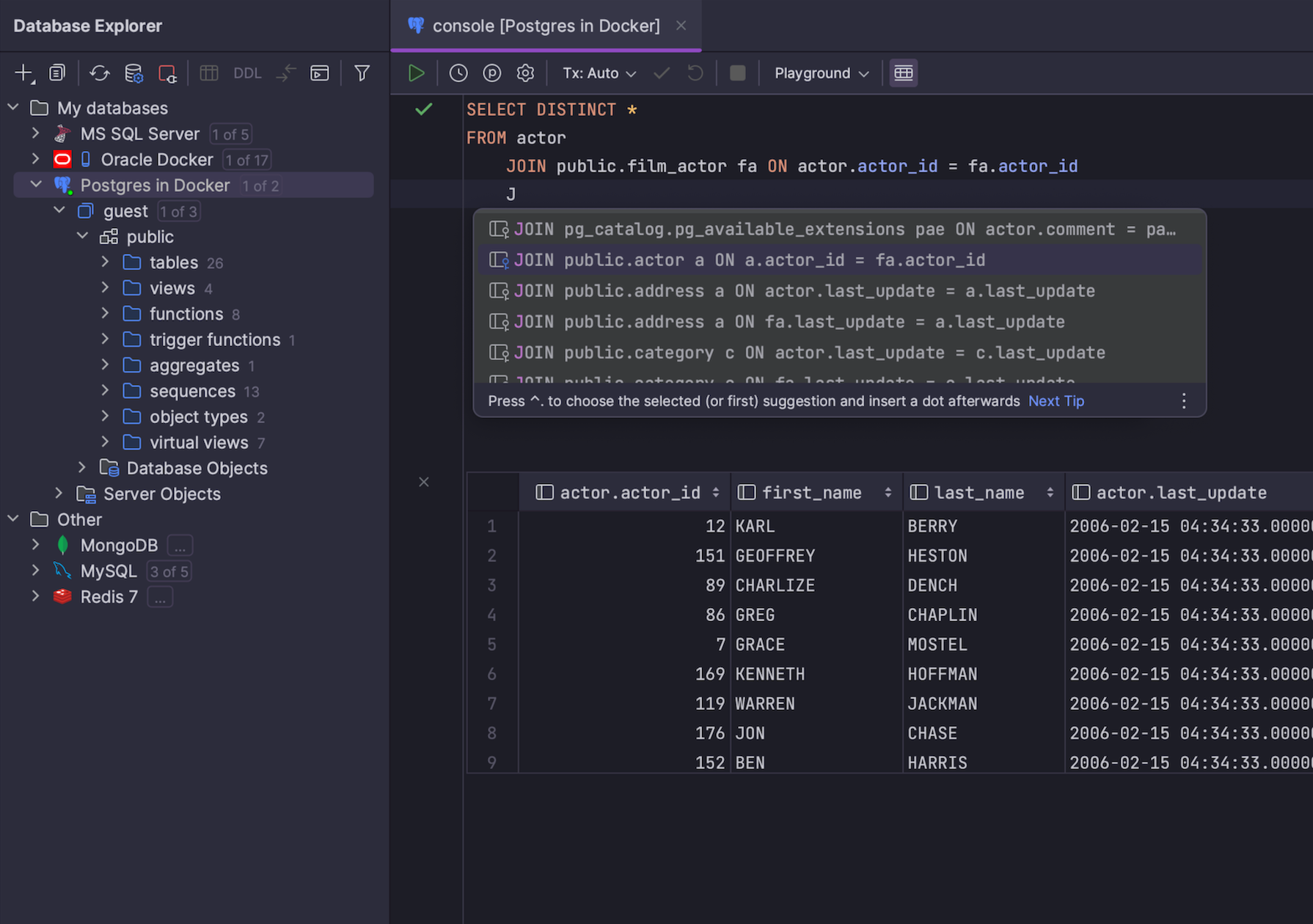
Pros:
- Very fast auto-complete
- Plug-ins available - Large marketplace with many useful add-ons
- Notifications when long queries have completed
- Refactorings that work in SQL files and schemas - Enable you to change column names and perform mass updates
- Version control integration
- Multi-Platform Databases, Including MongoDB
- Built-in support for all popular databases
- Easy flow to download relevant drivers
- Diff viewer for routines
- Introspection - You can observe collections and fields in the database explorer.
- Cross-platform - versions available for Windows, Linux and Mac OS.
- Easy way to export your schema and perform Automatic Database Tuning with EverSQL
- Very stable and reliable.
Cons:
- No free version. Only 30 days trial
Price: Starts at $99.00/year
Special Datagrip coupon code for EverSQL visitors: EVERDATAGRIP (3 months free)
#2 - DBeaver
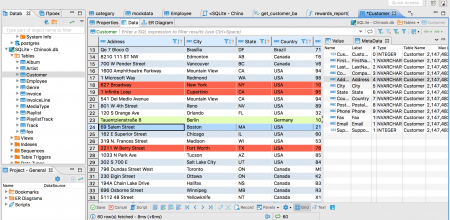
Pros:
- Multi-Platform Databases
- Intuitive and very easy to use user interface.
- Free to download, licensed under GPL.
- You can Render ERDs to visual your database
- Easy Import/Export/Backup
- Mock Data Generator
- NoSQL and BigData database support (Enterprise Edition Only)
- Visual Query Builder (Enterprise Edition Only)
- Analytical charts (Enterprise Edition Only)
- Query History (Enterprise Edition Only)
- Cross-platform - versions available for Windows, Linux and Mac OS.
- Easy way to export your schema and perform Automatic Database Tuning with EverSQL
Cons:
- Sometimes large queries can’t be stopped and have to be forcefully killed. In some cases, the entire application has to be killed.
Price: Free for basic usage. Enterprise Edition starts at $199
#3 - BeeKeeper Studio
Pros:
- Supports multiple database types such as MySQL and PostgreSQL.
- The UI is very easy and intuitive to use.
- Free and open source, with a large community of contributors and followers.
- Cross-platform - versions available for Windows, Linux and Mac OS.
- Supports SQL auto completion.
- Dark mode by default.
- Easy navigation between tabs.
- The software is very quick, and we ran into no lags or crashes.
- Allows to save queries and name them for future use.
Cons:
- Some database are not yet supported, so it can't be used as an all-in-one database IDE.
- Advanced database management capabilities such as restoring SQL dumps or data migration capabilities are not yet available.
- There is currently no plugins system supported, to no community enhancements are available.
Price: Free, open source
#4 - MySQL Workbench
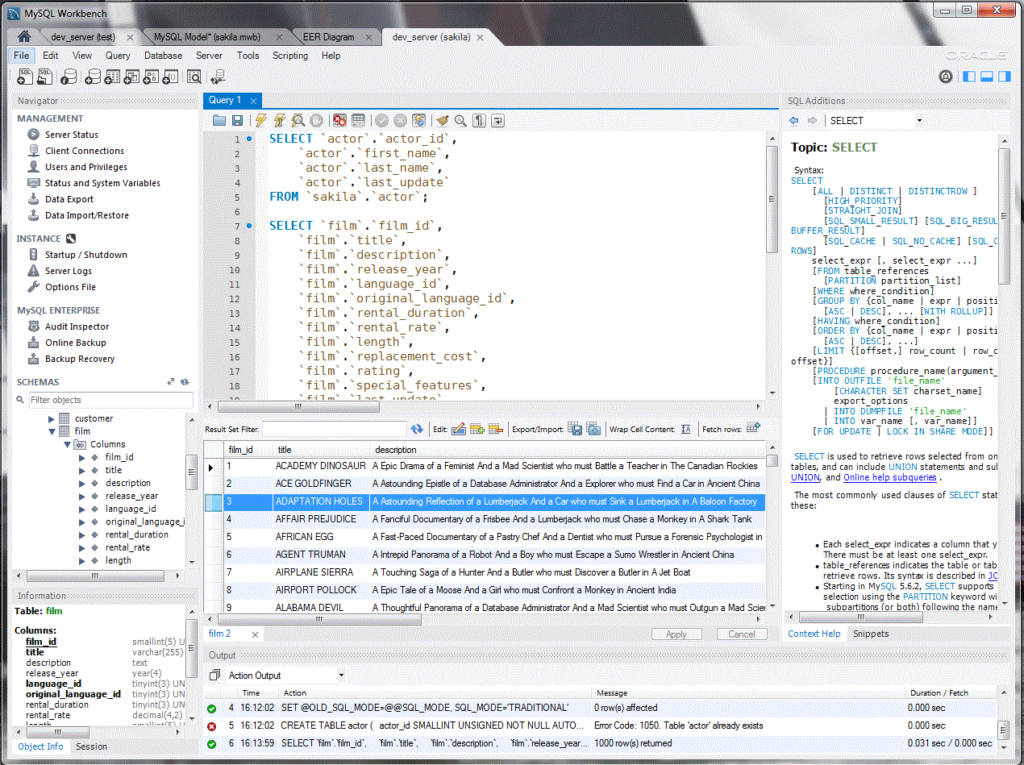
Pros:
- Intuitive and very easy to use user interface.
- Free to download, licensed under GPL.
- Cross platform - versions available for Windows, Linux and Mac OS.
- Visual schema and query builder.
- This is the only SQL client which is supported and developed by MySQL, so you can be sure that it will contain all recent features to match the updates for MySQL's server.
- Allows optimizing SQL queries directly from the IDE, using a plugin developed by EverSQL.
Cons:
- The software is sometimes buggy some users report software crashes.
- Sometimes large queries can’t be stopped and have to be forcefully killed. In some cases, the entire application has to be killed.
Price: Free.
#5 - HeidiSQL
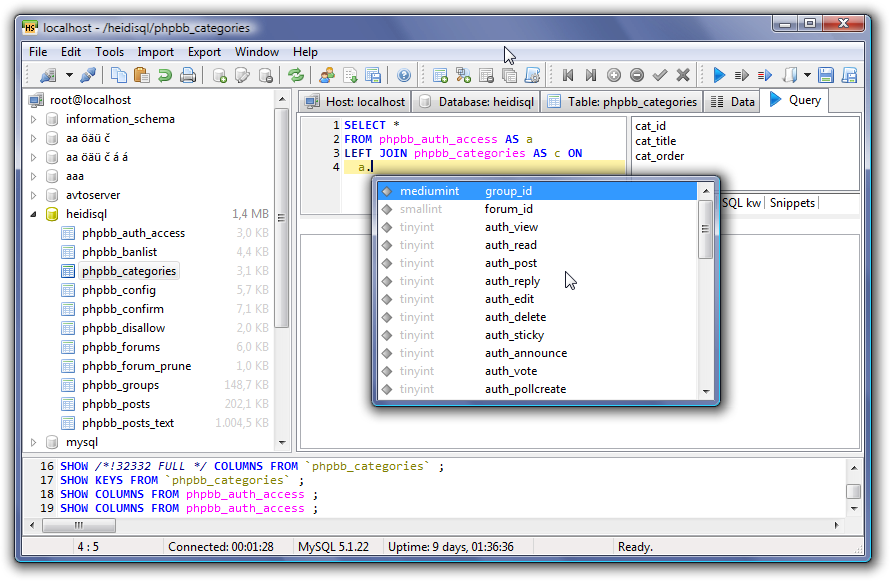
Pros:
- Easy to use and very intuitive user interface.
- Free to use - Licensed under GNU GPL.
- Portable version is available for download, so you can use it without administrative privileges, nor requiring installation.
- Full database user management and privileges management options.
- Automate connections via command line utility.
- Ability to connect to MySQL database via an SSH tunnel, in case you don’t have the default port open for remote connections.
- Great syntax checks and auto completion features.
- Can work with Linux distributions, but will require the Wine platform
Cons:
- Some users are reporting sudden crashes / bugs, but nothing that significantly interrupts the daily usage.
- Requires Wine for Linux.
- No official support for Mac OS.
Price: Free
#6 - dbForge Studio for MySQL
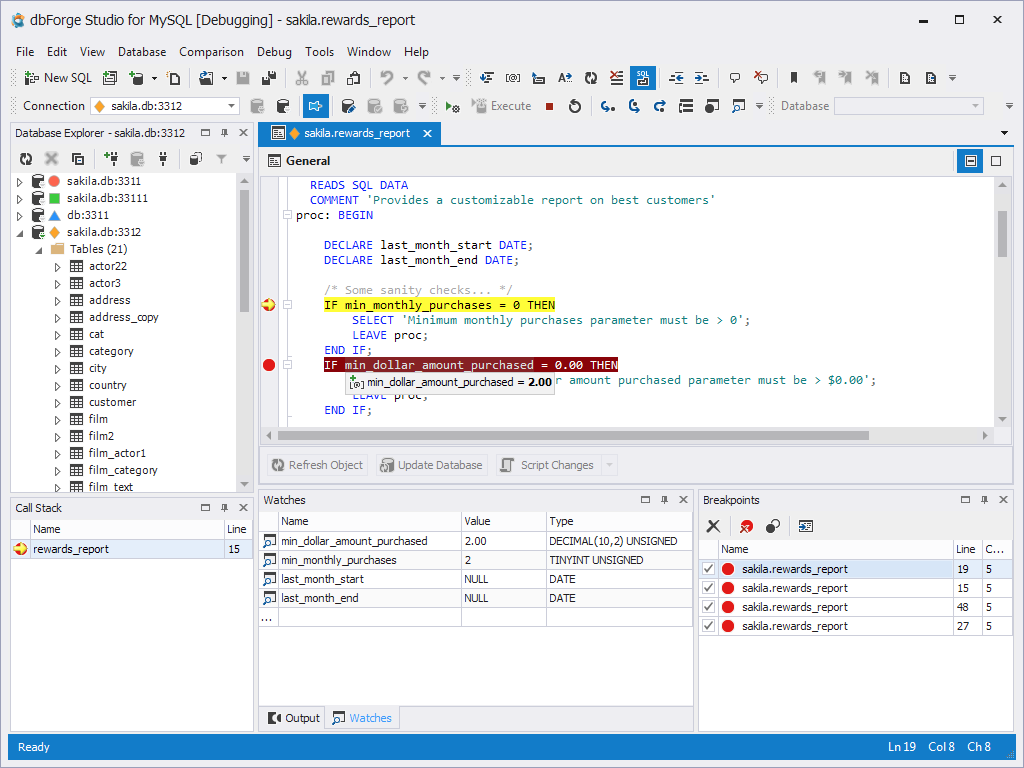
Pros:
- Comfortable user interface for both beginner and advanced users.
- Built in query profiler that allows to profile the query and compare it with other queries.
- Debug your query, step by step, using the known watch, call stack and breakpoint concepts.
- GUI query builder and database builder. Drag and drop to build your own custom queries and database schema.
- Good syntax completion and checker.
- Full database user management and privileges management options.
- Backup wizard that allows to schedule database backups.
- Allows storing code snippets.
- Good support for running large SQL files (without opening them).
Cons:
- The full version has a high price tag on it, so not everyone will be able to afford it.
- Very basic JSON viewer (for example, no ways to collapse or expand blocks of data).
- Users report that in some cases the auto complete feature stops working, whenever many connections are opened.
Price: up to $249.95.
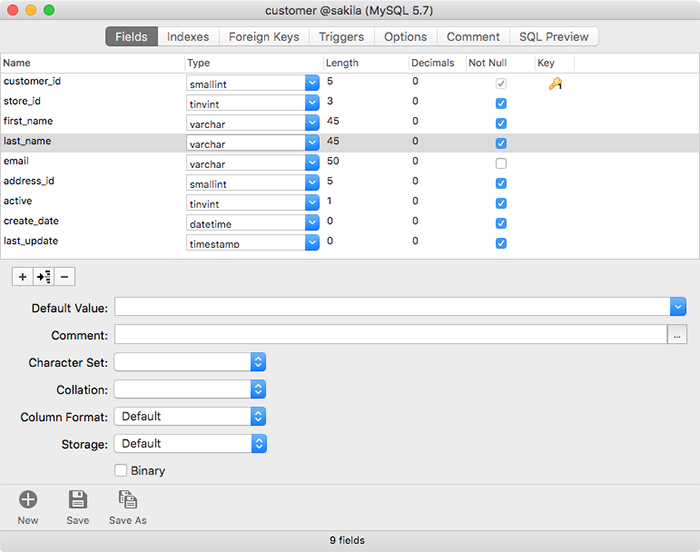
Pros:
- Intuitive, easy to use UI.
- Ability to connect to MySQL database via an SSH tunnel, in case you don’t have the default port open for remote connections.
- Schedule database jobs - backup, restore, run reports and more.
- Import data from: ODBC, Excel, Access, DBF, TXT, CSV, XML, JSON.
- Export data to: Excel, Access, DBF, TXT, CSV, XML, JSON.
- Visual schema and query builders.
- Cross platform - Windows, Linux and Mac OS versions are available.
- Syntax completion and checker.
- The premium version allows collaboration with team mates - share queries, connections and more.
Cons:
- High price point for the professional version.
- Uses Wine to be executed on Linux, which slows down the IDE.
- Some of the use cases require opening a new tab / window, which users report as a cumbersome process.
Price: up to $259.
#8 - SQLyog
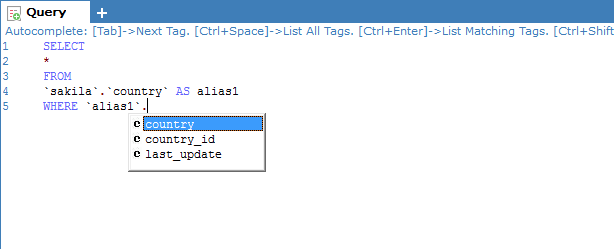
Pros:
- Very innovative and elegant user interface, best one we’ve seen.
- Visually design the schema tables, constraints and queries.
- Schedule tasks like backup, restore, email notifications and more.
- Personalize the look and feel with themes.
- The user interface is very customize-able.
- Fast and stable.
- Good data and schema sync tools.
- Ability to connect to MySQL database via an SSH tunnel, in case you don’t have the default port open for remote connections.
- The Ultimate version comes with a good data comparison tool.
Cons:
- High price point for the professional version.
- Some users report occasional software crashes.
- Lack of support for databases other than MySQL.
- No native support for Linux or Mac.
- No drag and drop support between multiple tabs.
Price: Up to $299.
Additional Must-Have MySQL tools
#1 - Text To SQL
Pros:
- Can generate complex SQL statements based on text.
- Aligned with your specific database version and version number. It will utilize the specific syntax and features available in your version.
- You can provide a SQL statement and ask to modify it, for example ask to change the query filter or join Query A with Query B.
- You can Include your schema - You can provide a schema via CREATE commands or via a description, so that you will get more accurate SQL Statements
Cons:
- Doesn't save history
Price: Free
#2 - MySQL Index Advisor
Pros:
- No DBA required. It will suggest missing indexes and provide related commands.
- It will analyze your schema and queries to identify which indexes are used.
- It Identifies redundant indexes to delete.
- Can generate another alternative with Covering Indexes (larger, but can be faster).
Cons:
- You can upload your schema manually or via API.
Price: Free
#3 - MySQL Performance Optimizer
Pros:
- Automatically rewrites SQL queries and optimize them.
- No DBA skills required.
- Provides insights such as workload analysis and new query load discovery.
- Educate users on best practices with real examples
- Analyze slow query logs and optimize queries in bulks
- Aggregate query executions by fingerprints for easier prioritization
- Support for both cloud-based and on-premise platforms
- Supports PostgreSQL on AWS EC2, AWS Aurora, Google Cloud SQL, Google Compute, Azure VB, Azure DB, Centos, Debian, Windows, Ubuntu and RedHat, Fedora and more.
Price: Free SQL optimization as a part of the free tier. 14-days free trial for advanced features. Starts at $79
